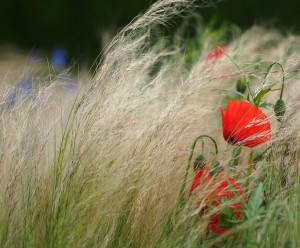Arghh!! Hayfever and Contact Lens Woes

The sun is shining, the flowers are in full bloom and everyone is in a better mood. We’re in the midst of Summer – one of the best times of year – so, what’s not to like?
What can be better than jumping out of bed in the morning, throwing open the curtains, opening the windows and taking a long, deep breath of the Summer air? While it might sound heavenly, we might actually find ourselves hit in the face with an unwelcome irritation. Arghhhhh! The pollen!
The Curse of Hayfever
Expectations are crushed as you end up running – all the while sneezing uncontrollably – to the bathroom to dig out your antihistamines.
Hayfever is a nightmare at the best of times, but it is made even worse when you also have to deal with contact lenses. Having itching red eyes should be bad enough without then having to place small plastic discs on the surface of your eye. Contact lenses can cause irritation on their own, so the addition of pollen is certainly an unneeded and unwanted exacerbation of an already volatile situation.
What’s more, these tiny little discs essentially act like an inviting landing pad for pollen and any other friendly neighbourhood airborne allergens to come and say hello.
Put simply: hayfever and contact lenses don’t mix. Ideally, you’d avoid them both altogether. But when you’re naturally cursed with allergies, are fed up with glasses, and haven’t yet decided to have Laser Eye Surgery, you probably feel that you have no other choice. Luckily, there are certain steps you can take to help stop them from being such a troublesome combination.
Before we get into that, though, if you suffer from hayfever, you’ve probably wondered — or shouted, if you’re like me — what the heck even is the pollen that causes you so much trouble anyway?
The Juicy Side of Hayfever
While it might cause us unfathomable irritation, the ingenious process that leads to pollen production is actually a wonder of the natural world. Pollen produced by flowers and other plants is released into the air to attach to everything and anything you can imagine. From bees and flies to our clothes and, unfortunately, our eyes, pollen is carried around for the fertilisation of other plants.
Simply put, hayfever is an allergy to these pollen particles. Symptoms develop when we come into contact with pollen – particularly when we breathe it in or it comes into contact with our eyes. This results in anything from itchy and watery eyes to sneezing, coughing, headaches, and tiredness.
As different plants have evolved different types of grains to try and more safely and effectively carry their DNA, you can find you may be severely allergic to one type of pollen and don’t even flinch at another. This also means your allergies can flare up according to the time of the year and the environment you’re in.
The three main types of pollen that are linked with hayfever are tree pollen, grass pollen, and weed pollen. In general, in the UK, tree pollen is most common from late March to mid-May, grass pollen from mid-June to July, and weed pollen from late June to September.
This means that the pollen count is at its highest and hayfever at its worst between late March and September – Spring and Summer. But the severity and timing of your symptoms may also depend on the climate. For example, pollen levels tend to rise (along with our suffering) as the weather gets warmer, more humid, and windier.
What can you do about it?
In line with standard advice for contact lens use, the number one rule is to keep them as clean as possible. There is no getting past the extreme contact between lenses and the surface of your eye – that is what they are designed for, after all. But, this close contact can often put wearers at a higher risk of infection.
This risk is exacerbated by touching or rubbing your eyes – something that becomes even more irresistible when you are also suffering from hayfever. But doing so can lead to even more intense exposure to pollen particles.
It is essential, then, to keep both your hands and your lenses clean in order to minimise the spread of pollen. Avoid rubbing or touching your eyes – no matter how tempting it might be. Making sure to shower and change your clothes after spending time outside, as well as vacuuming and dusting often, can also be helpful in limiting your exposure to pollen.
Of course, the most effective way to avoid pollen is to stay indoors when pollen counts are high. But when you do venture out, you can help stop pollen from irritating your eyes by wearing wraparound sunglasses, using a pollen filter for the air vents in your car, and using lubricating eye drops to keep your eyes moist and filtering well. The Met Office also has a great pollen forecast tool which you can use daily to check the pollen count in your area.
Don’t let hayfever and contact lenses stop you from enjoying the long-awaited Spring and Summer months. Sure, you may not be able to get rid of your allergies altogether, but you can get rid of those pesky plastic lenses.
If you would like to learn more about how Laser Eye Surgery could help rid you of contact lenses and glasses, Book a Consultation today. Alternatively, give us a call on 020 7224 1005.


